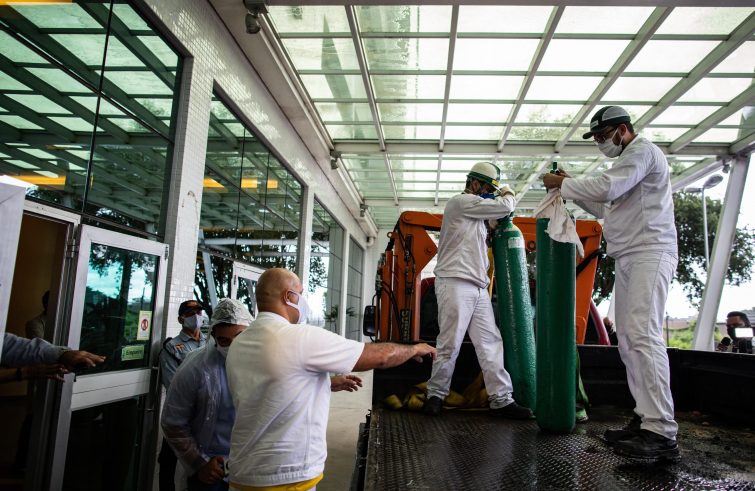
“The whole situation is chaotic, there is a collapse in health care. When ICU patients die due to lack of oxygen,
it means that we have been abandoned.
When a State transfers its sick citizens to other locations, it means that the situation spiralled out of control.
The government’s insensitivity, its failure to take action to assist people requiring hospitalization, is cause for concern.”
The Archbishop of Manaus, Dom Leonardo Ulrick Steiner, interviewed by SIR, makes no concessions in describing the dramatic circumstances unfolding in the capital of the State of Amazonas, now again recording among the world’s highest COVID-19 death toll after nine months. Manaus is facing a dramatic situation, which can barely be measured by numbers alone (over 200 burials per day on average over the last four days).
 There is lack of hospital beds, people are dying at home, or are not receiving adequate treatment because hospitals have run out of oxygen. Last Friday, for a few hours, it was feared that premature babies would have to be transferred to another city, since there was no assurance that oxygen would be provided for them either.
There is lack of hospital beds, people are dying at home, or are not receiving adequate treatment because hospitals have run out of oxygen. Last Friday, for a few hours, it was feared that premature babies would have to be transferred to another city, since there was no assurance that oxygen would be provided for them either.
This tragic scenario is doubtless due to a possible ‘Brazilian’ variant of the virus similar to the English and South African ones. However, it is mostly linked to the neglect mentioned by the archbishop,
which is not made up for by the solidarity effort launched last weekend (for example, Honda Motor company announced it will donate 300 oxygen cylinders), while the State of São Paulo announced it would administer 50,000 doses of “its own” Sinovac-Butantan vaccine, causing the irritated response of Health Minister Eduardo Pazuello who claimed that São Paulo governor João Doria’s rush to start vaccinating immediately was an illegal “marketing ploy.”
Jesem Orellana, an epidemiologist monitoring the Amazon region for the prestigious Fiocruz Foundation in Rio de Janeiro, told SIR:
“The new strain of the virus exists, as has been documented by our foundation, but this is the fifth reason for what is happening in Manaus.
There are four others before that: the serious and long-standing problem of corruption in the area of public health policies; the widespread precarious housing situation and poverty, which make the population particularly vulnerable; there is only one hospital per 5 million inhabitants, with fewer than 40 intensive care beds – you cannot have 6 people dying in 5 minutes for lack of care; technical and political incompetence, combined with far right COVID-19 deniers. There is also the virus variant, but the infection spread because they created the conditions for this to happen. Manaus was one of the worst-hit Brazilian cities in the first and second waves of the epidemic, and this is something to reflect on.
In the meantime, ‘transferring patients to other cities risks severely spreading the contagion to the rest of Amazonia’.
Dom Steiner answered our questions against this dramatic backdrop, adding a further concern, that of “reaching out to the brothers and sisters living on the streets of Manaus. We managed to mitigate the situation to some extent by offering them meals. But there is no place for them to take shelter in this rainy season.
In your opinion, why was Manaus unprepared for this second wave after such a tragic first wave?
No specific policy has been put in place to combat the pandemic.
Many people, including national government leaders, live in denial, as if the virus is only affecting others.
The local election and the busy shopping season over Christmas led to increased circulation of the virus. The government acted negligently with regard to the purchase of oxygen.
In fact, no lessons were learnt from the first wave of COVID-19.
We see a lack of leadership, with no government team tasked with engaging society in coping with the pandemic.
Are there shortcomings and mistakes in policies at national and federal level?
Wrong policy decisions were made at Federal level with respect to the national pandemic. With regard to the State of Amazonas, the lack of proper planning and misperception of the severity of the pandemic has meant that actions were taken after a situation of extreme crisis, now virtually irreversible.
What is the most urgent concern?
We are facing two serious emergencies: lack of oxygen and intensive care beds.
People are dying because of a lack of intensive care beds and lack of oxygen.
Where do you stand regarding the debate on vaccines?
Brazil has a long tradition of vaccinations. There were no concerns about identifying laboratories with the capacity to prepare vaccines. The government ignored our research centres and encouraged non-vaccination.
Ultimately, it was anti-politics.
Politics requires listening and talking. Instead, we are faced with self-interest for electoral purposes which denigrates politics while the death toll increases.
Do you believe you did the right thing by celebrating Holy Masses without the faithful, even though it is an essential service laid down by law?
We noticed an increase in the number of infections just before Christmas, it was like a second wave.
When we realized that the situation could spiral out of control we decided to suspend celebrations in the presence of the faithful.
This decision was taken despite the fact that churches are considered an essential service, meaning that places of worship can remain open. Where feasible, churches remain open for visits to the Blessed Sacrament and individual prayer. We continue streaming religious services online and, on Sundays, the celebration in the cathedral is broadcast on Encontro das Águas television and by the radio stations of the archdiocese. We are planning to consult with the clergy and the leaders of the various bodies, but we will have to postpone celebrations with the presence of the faithful.
What is your appeal to the rest of Brazil, and to the international community?
It is important for us to do away with coronavirus denialism, with destructive and deadly ideologies, with policies that undermine relationships, and with profits gained from the suffering of individuals, families and peoples.
Let us offer the best of our humanity at the service of the sick, especially our spiritual resources.
We stand with Pope Francis, who urges us to appreciate the greatness of being all sons and daughters of God, of belonging to one another as one human family. This is a time for caring, for solidarity, for compassionate love, for comfort, to allow our Christian nature to emerge. We feel that we are members of a large gathering where we pray for one another.
(*) journalist at “La Vita del popolo”









